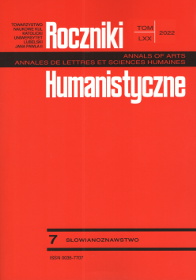The “Word” and “Deed” of St. Paisius Velichkovsky: On the 300th Anniversary of the Ascetic’s Birth
Abstract
By the 19th century, the paths of Europeanised, secular Russia and the people’s “Holy Russia” had finally diverged. Nikolai Berdyaev reasoned that Seraphim of Sarov and Alexander Pushkin were contemporaries, but did not know about each other as they lived in separate worlds, that of literature and that of holiness. However, at the same time, in the second half of the 18th century in the monasteries of Moldavia, there was a man about whom Pushkin almost certainly heard and whose writings were carefully read by St. Seraphim. His name was Paisius Velichkovsky (1722-1794) and in his work he outlined ways to overcome the “split” that had taken place. The disciples of Paisius found refuge in Russian monasteries, his writings and translations of patristic texts enjoyed exceptional popularity among the monastic community, and his successors revived the phenomenon of the Optina eldership, as a result of which almost all literary classic writers from Gogol to Prishvin visited the Optina Monstery. The author of this article is primarily interested in Paisius as the author of his own biography. In addition to this text, there are several versions of the life of this ascetic, composed either by his disciples or by the disciples of his disciples. The autobiography does not resemble a life at all; in terms of genre, it is rather an adventure novel, whereas the life of Paisius, written by his disciple Mitrofan, fully corresponds to the hagiographic canon. The Paisian texts, combined into a single corpus, give an idea not only about the personality of the ascetic, but also about the meeting of two literary systems: that which still gravitated towards the traditions of the Middle Ages, and that which was inspired by the Early Modern Period. The personality of Paisius harmoniously combined those features traditional for an ascetic monk (a reference figure for the Russian Middle Ages), and those that revealed in him a dynamic 18th‑century man. The author of this article is convinced that not only the legacy of Saint Paisius, but also his image, is the embodied answer to the question of how to overcome the “split”.
References
Borovkova-Maykova, Mariya. «Nil Sorskiy i Paisiy Velichkovskiy». S. F. Platonovu – ucheniki, druzʹya i pochitateli. Tip. Gl. upr. Udelov, 1911, ss. 27-83. [Боровкова-Майкова, Мария. «Нил Сорский и Паисий Величковский». С. Ф. Платонову – ученики, друзья и почитатели. Тип. Гл. упр. уделов, 1911, сc. 27-83].
Briskina-Muller, A[nna] M[ikhaylovna]. «Stranniki, bezhentsy, bogomolʹtsy. Prp. Paisiy Velichkovskiy i problema palomnichestva». Voprosy teologii, t. 1, no. 2, ss. 235-251 [Брискина-Мюллер, А[нна]. М[ихайловна]. «Странники, беженцы, богомольцы. Прп. Паисий Величковский и проблема паломничества». Вопросы теологии, т. 1, № 2, 2019, сс. 235-251].
Krivolapov, V[ladimir]. «Optina pustynʹ: yeyë geroi i tysyacheletniye traditsii». Prometey. Molodaya gvardiya, t. 16, 1990, ss. 126-148 [Криволапов, В[ладимир]. «Оптина пустынь: её герои и тысячелетние традиции». Прометей. Молодая гвардия, т. 16, сс. 126-148.]
Popov, N[ikolay] P[yetrovich]. «Rukopisi Moskovskoy Sinodalʹnoy (Patriarshey) biblioteki.» Vyp. 2. Sobraniye rukopisey Moskovskogo Simonova monastyrya. Chteniya v Imperatorskom obshchestve istorii i drevnostey rossiyskikh pri Moskovskom universitete. Kn. 2 (233), Tip. I slovolitnya O.O. Gerbeka, 1910. [Попов, Н[иколай] П[етрович]. «Рукописи Московской Синодальной (Патриаршей) библиотеки.» Вып. 2. Собрание рукописей Московского Симонова монастыря. Чтения в Императорском обществе истории и древностей российских при Московском университете. Кн. 2 (233). Тип. и словолитня О.О. Гербека, 1910.]
Prepodobnyy Paisiy Velichkovskiy. Avtobiografiya. Zhitiye. Svyato-Troitskaya Sergiyeva Lavra, 2006. [Преподобный Паисий Величковский. Автобиография. Житие. Свято-Троицкая Сергиева Лавра, 2006].
Robinson, A[ndrey]. Zhizneopisaniya Avvakuma i Yepifaniya. Izdatelʹstva AN SSSR, 1963 [Робинсон, А[ндрей]. Жизнеописания Аввакума и Епифания. Издательства АН СССР, 1963]
Startsy otets Paisiy Velichkovskiy i otets Makariy Optinskiy i ikh literaturno-asketicheskaya deyatelʹnostʹ. Afon. rus. Panteleymonov monastyr', 1909. [Старцы отец Паисий Величковский и отец Макарий Оптинский и их литературно-аскетическая деятельность. Афон. рус. Пантелеймонов монастырь,1909].
Tahiaos Antone-Emil N. The Revival of Bizantine Misticism among Slavs and Romanians in the XVIIIth Centhury. Texts Relating to the Life and Activity of Paisy Velichkovsky (1722-1794). Aristoteleion Panepistemion Thessalonikes, 1986.
Yatsimirskiy, A[leksandr]. «Neskolʹko momentov iz istorii russkogo religioznogo mistitsizma». Strannik t.1, tchast΄ 2, 1906, ss. 737-747 [Яцимирский, А[лександр]. «Несколько моментов из истории русского религиозного мистицизма». Странник, т.1, ч. 2, сс. 737-747.
Yatsimirskiy, A[leksandr]. Vozrozhdeniye vizantiysko-bolgarskogo religioznogo mistitsizma i slavyanskoy asketicheskoy literatury v XVIII veke. Tipolitogr. S.A. Shmerkovicha, 1905 [Яцимирский, А[лександр]. Возрождение византийско-болгарского религиозного мистицизма и славянской аскетической литературы в XVIII веке. Tиполитогр. С.А. Шмерковича, 1905].
Zhitiye i pisaniya moldavskogo startsa Paisiya Velichkovskogo. Izd. Kozelʹskoy Vvedenskoy Optinoy pustyni, 1847. [Житие и писания молдавского старца Паисия Величковского. Изд. Козельской Введенской Оптиной пустыни, 1847].
«Zhitiye i podvigi ottsa nashego Paisiya, arkhimandrita moldavskikh svyatykh monastyrey Nyametskogo i Sekula.» Moskvityanin, tcastʼ II, no. 4, 1845, ss. 1-78 [Житие и подвиги отца нашего Паисия, архимандрита молдавских святых монастырей Нямецкого и Секула. Москвитянин, ч. II, № 4, 1845, сс.1-78].
Copyright (c) 2022 Roczniki Humanistyczne

This work is licensed under a Creative Commons Attribution-NonCommercial-NoDerivatives 4.0 International License.





